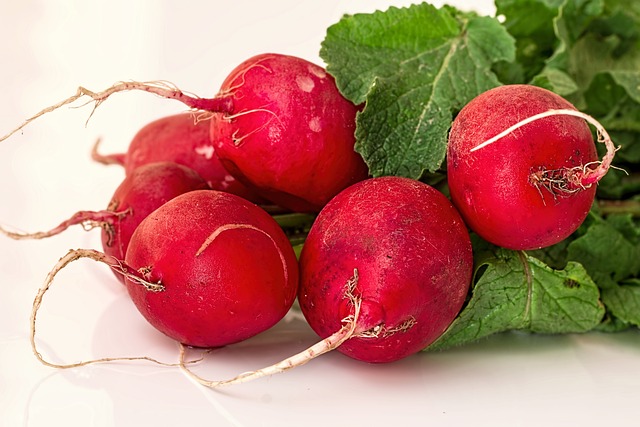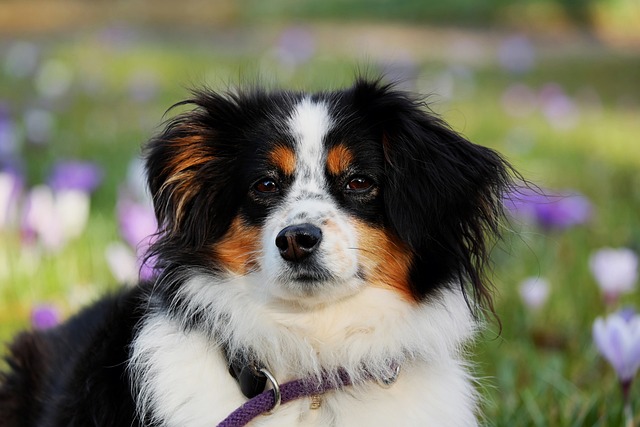
Radishes, a common root vegetable, are a staple in salads and healthy snacks for humans. But when it comes to sharing our foods with our dogs, it’s crucial to understand which foods are safe and beneficial for them. Wondering can dogs eat radishes? This article explores why they can, the nutritional benefits, potential risks, and recommended serving suggestions.
Table of Contents
Are Radishes Safe for Dogs?
Radishes are okay for dogs to eat in moderation, in fact, their rough texture can even help to remove some plaque on your dog’s teeth for fresher breath. However, while radishes are not toxic to dogs, there are a few considerations to keep in mind:
- Digestive Upset: Some dogs may not like the peppery flavor of radishes, and their digestive systems may not handle the crunchy vegetable well, potentially leading to an upset stomach.
- Choking Hazard: Large pieces of radish can pose a choking risk, especially for small dogs.
- Moderation: Due to their fiber content, excessive consumption of radishes can lead to digestive issues like diarrhea or gas.
How Many Radishes Can Dogs Eat?
Radishes are not a common component of a dog’s diet, but they can be offered in small amounts. When introducing radishes, it’s important to start with a very small amount of peeled radish to see how your dog reacts. Here are general guidelines based on dog size:
- Extra Small (<10 lbs): Start with a very small piece that’s about 1/8 of an inch to see how your dog reacts.
- Small (10-25 lbs): Begin small, a piece that’s about 1/4 of an inch.
- Medium (25-60 lbs): Offer a piece that’s about 1/2 an inch.
- Large (60-100 lbs): You can start with up to a piece that’s around 3/4 of an inch.
- Giant (100+ lbs): A giant breed dog can have a 1 inch piece of radish or slightly more, but it’s crucial to monitor for adverse reactions. Even for large breeds, radishes should remain a rare treat rather than a diet staple.
Always introduce any new food slowly into your dog’s diet and in moderation, watching closely for any adverse reactions. Remember, treats like this should not make up more than 10% of your dog’s total daily caloric intake to maintain a balanced diet. Before offering a new food like radish to your dog, consult with a vet to ensure it’s right for their specific health needs.
Nutritional Benefits of Radishes
Radishes are low in calories and a good source of vitamins, dietary fiber, and some essential minerals like potassium and calcium. They also contain small amounts of other vitamins and minerals. Here are some other health benefits of radishes:
- Low Calorie: Their low-calorie content makes radishes a good treat option for dogs on a weight management plan.
- Hydration: Radishes have a high water content.
- Fiber: The dietary fiber in radishes can aid in digestion and promote bowel regularity.
- Vitamins and Minerals: The vitamin C in radishes can support the immune system, while the potassium contributes to certain healthy bodily functions.

Preparation Tips
- Wash Thoroughly: Wash any dirt or chemicals off the radishes first.
- Peel: Peel the skin off first and remove the leaves.
- Small Quantities: Start with a small piece to see how your dog reacts.
- Chopped: To minimize the choking risk, serve radishes chopped into manageable pieces or shredded, especially for smaller dogs.
- Preparation: Avoid adding any seasonings or oils when preparing the radish for your dog.
- Mix with Other Foods: You can mix a small amount of radish with your dog’s regular food to introduce the new flavor gradually.
Allergies
Radish allergies in dogs are relatively uncommon, but like any food, radishes can potentially cause an allergic reaction in some dogs. An allergic reaction to radishes, or any food in general, can manifest in various ways. Here are some symptoms to watch out for if you suspect your dog might be allergic to radishes:
- Skin Irritations: Anything from itchiness, redness, hives, or rashes on the skin.
- Gastrointestinal Issues: Symptoms such as vomiting, diarrhea, excessive gas, or abdominal discomfort can indicate a food allergy.
- Ear Problems: Allergic reactions can sometimes lead to ear infections.
- Respiratory Symptoms: Although less common, some dogs might show respiratory symptoms due to an allergic reaction.
- Paw Licking or Biting: Dogs might lick or chew their paws excessively if they are experiencing an allergic reaction.
- Facial Swelling: Swelling around the face, eyes, or mouth can be a more serious sign of an allergic reaction and requires immediate veterinary attention.
If you notice any of these symptoms after your dog eats radishes, it’s essential to stop feeding it to them right away and consult with your veterinarian. It’s also crucial to remember that introducing any new food into your dog’s diet should be done gradually and in small amounts to monitor for any adverse reactions.
Thus, radishes can be an okay treat for dogs when given in moderation and properly prepared. They offer hydration, fiber, and essential nutrients with minimal calories. However, it’s important to introduce radishes to your dog’s diet gradually and observe their reaction. Always prioritize your dog’s overall dietary balance and consult with a veterinarian before introducing new foods, especially if your pup has existing health issues or dietary restrictions.
FAQ
Can Dogs Eat Radish Leaves?
It is not recommended that you feed your dog radish leaves because they can be hard to digest. Additionally, the leaves can cause gastrointestinal upset in dogs, so it’s best to keep the leafy parts away from them.
Can Dogs Eat Radishes Raw?
Generally, dogs can eat radishes raw, given that they are peeled and chopped into manageable, bite sized pieces without the leaves. However, many dogs might not like the taste of the raw radish or can get an upset stomach from it. Always consult with your vet first before introducing new foods to your dog to ensure you know the risks associated with feeding it to your unique pet.
Can Dogs Eat Radishes Cooked?
Dogs can eat cooked radishes as long as they have been peeled, chopped into appropriate sized pieces, and the leaves are removed. Ensure that the radishes are not cooked with any oils, salt, seasonings, sauces, or any other additives as these can be harmful to dogs. Always check with a vet first before offering new foods to your pup.
Can Dogs Eat Radishes That Are Pickled?
No, it is not recommended for dogs to eat pickled radishes because of the added seasonings and salts used in the pickling process, which could be harmful to dogs. Pickled radish may also irritate your dog’s stomach and cause gastrointestinal upset.
Can Dogs Eat Radishes And Celery?
If your dog does not like the taste of radish or you’re looking for a different veggie that they can try, then yes, dogs can eat celery in moderation and in small portions. However, always consult with a vet before introducing your dog to new foods like celery.
Recipes
When incorporating radishes into your dog’s diet, it’s important to do so with simplicity and moderation in mind, given that some dogs might not enjoy the spicy taste or could have a sensitive digestive system. Here are a few simple but refreshing radish recipes tailored for dogs:
Plain Sliced Radish
- Ingredients:
- Fresh radishes.
- Instructions:
- Wash the radishes thoroughly before peeling them and slice into thin, small pieces that are easy for your dog to chew and digest.
- Offer a slice as a treat to see how your dog reacts.
Frozen Radish Treats
- Ingredients:
- Fresh radishes.
- Low-sodium chicken or beef broth (make sure it doesn’t contain onions, garlic, or other harmful ingredients).
- Instructions:
- Puree the washed and peeled radishes with a small amount of broth until smooth.
- Pour the mixture into ice cube trays or silicone molds and freeze.
- These frozen treats can help cool down your dog on hot days.
Check out some related articles:


